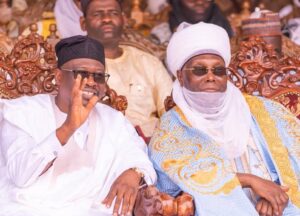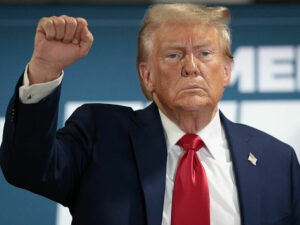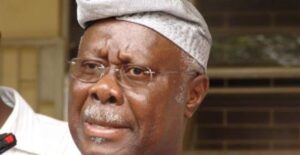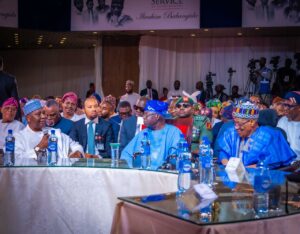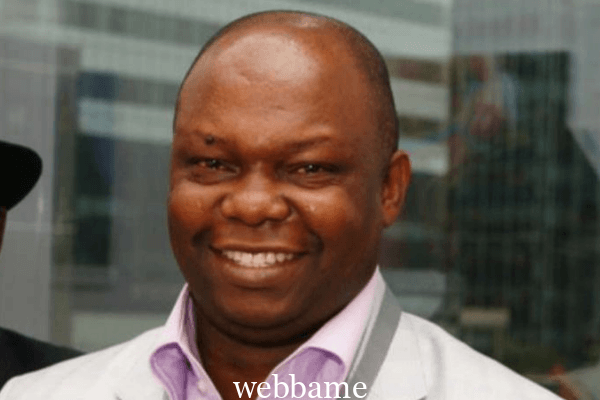
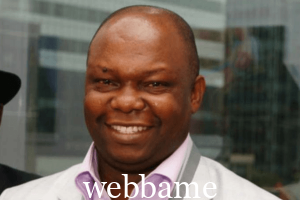
ATIKU ABUBAKAR AND THE SEXUAL HISTORY OF THE NIGERIAN PRESIDENCY -FESTUS ADEDAYO
By Festus Adedayo
In early 2014, the Zimbabwean public sphere literally caught fire. Rumours that the country’s former Prime Minister and the presidential candidate of the Movement for Democratic Change, (MDC) Morgan Tsvangirai, had suffered “a nasty blow from below,” euphemism for zero virility, spread like bushfire. At about the same time, the virility-restoring prowess of Emmanuel Makandiwa, a ‘miracle-working’ Pentecostal prophet, froze the stratosphere like snowflakes in winter. Estranged wife of Tsvangirai, Elizabeth Macheka, had lit the fire. In an interview she granted The Herald, which was entitled, Why I ditched Tsvangirai: Wife Macheka had been quoted to have said that she had separated from Tsvangirai due to ‘sensitive personal issues’ and that this was known to her and Tsvangirai alone and which only the two of them could resolve.
The above story was told by Wale Adebanwi, highly respected scholar, in a recently published journal article he entitled The Carnality of Power. Therein, Adebanwi had explored the centrality and virility of power and how men of power, through their libido, use sex as a locus of power, as well as how all of us, scholars, lay scholars and society as a whole, “need to pay greater attention to the ways in which obscenity can help explain the nature of power.
For a Zimbabwean public that salivated on riveting gossips and rumours in high and low places, Macheka’s statement was the confirmation it needed for a high-quality rumour it hitherto circulated. In whooshing whispers and mouth-to-ear transmission, the former prime minister was said to have been afflicted by an “under-neath,” below-the-trousers problem of ‘erectile dysfunctional disorder.’ The Herald did not also help matters. It immediately and unabashedly tagged what Macheka dubbed ‘sensitive personal issues’ as ‘a medical one.’ Thereafter, Fungai Machirori, Zimbabwean journalist and blogger, did a salacious piece on the issue which she entitled, Of Penises, Politics and Pentecostalism in Zimbabwe, an essay which she called an “exposé of trouble in the un-paradise that is Tsvangirai’s love life’’
As the story went, in the bid to seek spiritual remedy for the restoration of his numb member, Tsvangirai had to make a sudden visit to Nigeria to meet the infamous miracle-hawking pastor, T. B. Joshua, now late. Joshua had been catapulted to the zenith of Zimbabweans and Southern Africans in general’s migration to his shrine for spiritual patronage due to a 2012 prophecy he made that an African leader who he said was ‘old and unwell,’ would die. At the exit of Malawian president, Bingu wa Mutharika,, the popular belief was that Joshua was ‘spiritually powerful.’ However, Macheka, unable to contain the penile starvation from Tsvangirai, had packed her things and fled her marital home.
The Zimbabwean yellow press world immediately interpreted this visit to Lagos by Tsvangirai as a spirited spiritual search for cure to what Adebanwi tagged his “double jeopardy” – an under-the-trousers virility trouble and a dwindling political fortune.
In his own penis-restoration evangelism, Makandiwa, who is the founder of the Zimbabwe-popular United Family International Church (UFIC), was said to have, during a New Year’s Day service, performed “a penis-enhancing miracle” on a Namibian. The penal calamity that the Namibian suffered from was said to be such that his private member was “the size of a two-year-old’s” and because of this phallic deficiency, he had to run from pillar to post so as to be able to prevent his own “Macheka” from eloping. In the report of what transpired, Prophet Makandiwa had reportedly commanded the Namibian’s miniature member to “arise!” and thereafter, according to an eyewitness, “first month grow, second month grow, third month grow, fourth month grow, fifth month, ummm stop,” such that, “the organ must have grown exponentially until the prophet decreed it to stop.”
For those who think less of the power of sex in high places, Oscar Wilde, Irish poet and playwright, was ready to shock them. “Everything in the world is about sex, except sex. Sex is about power,” he had written. Scholars have taken the Wilde libidinous theorising further to say that there is an intersection between gender, sexual power and political power. So in the analysis of political power, a belittling of sex and sexual power could be a barren pursuit. Indeed, as Adebanwi said, there is an expectation that “the African man of power must display or exhibit his virility – particularly sexual virility.”
Last week, the place of sex in the Nigerian presidency became an issue of discourse. 2019 presidential candidate, presidential hopeful in the 2023 presidential election and former Nigerian Vice President, Atiku Abubakar, had suffered a fate though not similar to Tsvangirai’s but not totally dissimilar to it. Linking both is a single thread of marital dislocation, a desire by one partner in a patrimony to discontinue on a sexual voyage, though ostensibly for different reasons. Atiku Abubakar’s own “Macheka,” Jennifer Iwenjiora Douglas Abubakar, until now his wife and a former Nigerian Television Authority (NTA) correspondent in the 1980s, had gone to her own “The Herald” last Tuesday to narrate that her marriage to the stupendously wealthy politician named Turaki had broken down irretrievably with effect from June 26, 2021. Jennifer had loomed large as subject of a probe some 12 years ago by the United States Senate Committee on Homeland Security and Government Affairs, chaired by Senator Carl Levin, alleging that she, in cahoots with her husband, had funneled slush funds allegedly stolen from the Nigerian government, into America.
“The core reason for the divorce was disagreement over my continued stay in the United Kingdom, to look after my children and several other long-standing issues. I needed to play the role of a mother at this time to the children who have gone through the absence of both father and mother growing up; especially, with the passage of my elder sister who used to look after them,” said Douglas, alongside issues of disagreements over ownership of Turaki’s Nigerian, Dubai and UK properties.
Respected columnist and serial Facebook posts activist, Kayode Samuel, had put the sexual/power implication of the matrimonial squabble in perspective. In a post he made immediately the Atiku-Jennifer divorce became public knowledge, he had written, “Dear Igbo babes, it seems a vacancy may soon be coming up (or has already come up!) for a new wife in the home of Alhaji Atiku Abubakar. The federal character-compliant attribute of his household was one of his strong selling points at the last elections. Now that his Igbo wife is leaving, I’m sure the old man would be thinking of making up her quota in time for 2023. So, up your game “sharperly“, ezigbo nwanyi oma! I won’t be charging anything for this piece of pricey intelligence. I’ll just take it to be part of my nwanwa duties…” Jennifer hailed from the Onitsha area of Anambra State.
Nigeria’s serial presidential candidate, the Turaki, seems to share fate with Zimbabwe’s Tsvangirai. Tsvangirai, aged 61, is “married as many times as he has lost in his bid to become Zimbabwe’s elected president.” This seems to be Abubakar’s lot too. Basking under the Islamic libidinous latitude which allows him to marry four wives, the Turaki went ahead to federal-characterized his libido by marrying Titi from Osun State, as well as other undisclosed women who must be from the northern part of Nigeria. Today however, Abubakar is facing his own double jeopardy of carnality and politics, like Tsvangira.
The political carnality jeopardy the Turaki is battling has to do with the fact that, Emperor Nyesom Wike and the Young Turk governors of the Peoples Democratic Party, (PDP) like the Namibian’s shrinking manhood, seem to have shrunk the spatial chance of presidential contestation in the PDP against Abubakar whose presidential aspiration’s cloud seems to be dimming. For a man ravaged by serial allegations of corruption during his tenure as Vice President and whose strongest credential for the Nigerian presidency is his democratic – if you like, laissez fare – under-the-trousers personal economy, having had wives from the three geopolitical zones of Nigeria, unlike his challengers whose libido is tribalistic and ostensibly unidirectional, Abubakar’s loss of Jennifer Douglas, a major tripod of his credential, could be a mortal political, rather than a familial blow, in the proportion of Tsvangirai’s loss of masculinity. The question many people are asking is, was Jennifer actually being reticent on the real reason(s) she had to do a Micheka on her own Tsvangirai?
Counterpoising Tsvangirai’s “blow from below” image are some African presidents who were “perceived to have used their manhood well.” In Nigeria, we had the goggled dictator, General Sani Abacha, who though multiple attempts have been made to impeach the narrative of how he died, but over whom the prevailing facts on the streets have prevailed, one of which is that, he died after consuming poisoned apple fruits administered by stealth by the CIA and using Viagra to pump up his virility while working on two Indian prostitutes imported for him at the presidential Villa. Another was late dictator President Gnasingbe Eyadema of Togo, renowned with an elephantine sexual appetite as huge as the Basilica in the Ivorian city of Yamoussoukro. He was known for always sleeping with wives of his male ministers and his few female ministers. One of the ministers, said to have been blessed with an ‘especially attractive’ wife, had to hide her from Eyadéma so that he would not lay his lecherous paws on her. In this virility league was also the late Zairean dictator, Mobutu Sese Seko. Mobutu was said to be as lecherous as a he-goat. This is not to forget the father of them all, the former South African president, Jacob Zuma, who is said to have married at least six times.
In Africa, when a man of power “uses his manhood well,” he is seen as not being effeminate as Tsvangirai. If he is then “blessed” with an imposing virility, whether he uses it licitly or illicitly, this easily gains traction, making his rule to be seen as dominant and domineering. Another example in this regard is Robert Mugabe, who never hid the illicitness of his virility and who had been dating Grace, who he later married, even before his late wife’s death.
The man of power who possesses the Eyadema, Zuma and Mobutu image of a libidinous behemoth in Nigeria’s power calculus is Olusegun Obasanjo. During the Petroleum Trust Development Fund (PTDF) saga when he and Abubakar aimed at each other’s jugular, Atiku had alleged that Obasanjo bought a 607 Peugeot car for a woman friend who resided in Abeokuta with slush funds accruing from the PTDF scandal. Like Mugabe, Obasanjo was then married to Stella, who was Nigeria’s First Lady. In 2018, Obasanjo’s son, Gbenga, even alleged in a court affidavit that his father was having an affair with his wife, Moji. Mrs. Patricia Etteh, the former Speaker of the House of Representatives, was also rumoured to be Obasanjo’s woman friend. In The Carnality of Power, Adebanwi talked about “one prominent and ‘internationally respected’ West African president (who was) famous for breaking meetings – even abroad – to have a ‘quickie’ with his countless paramours.”
Indeed, Nigeria had been “lucky” to have occupiers of the seat of power whose sexual virility was benumbing. Military President Ibrahim Babangida reportedly went out of Dodan Barracks to demonstrate the strength of his awesome libido. In a 2013 book he authored entitled Honour for Sale: An inside account of the murder of Dele Giwa, a military aide to Babangida, Major Debo Basorun, wrote about how, on a trip to France, late First Lady, Mrs. Maryam Babangida, literally pummeled her husband for his presidential libidinous rascality.
Taking the opportunity of a long official meeting he had that dragged into the thin hours of the morning, IBB had engaged a paramour in a liaison whose dalliance with her husband Maryam got to know through the scent of her perfume in IBB’s hotel suite. Dealing the General heavy blows under locked door, when the Better Life for Rural Women proprietress eventually opened the door to IBB’s scared aides who had been ordered by a senior officer to prise the door open upon hearing noise of violence in the suite, they saw a C-in-C, renowned for his braggadocio that “we are not only in office but in power” whose face had been pockmarked by bruises from feminine paws. He was panting amid sweats, with a roughened military service dress which had some buttons torn off by a woman scorned into fury by the stray libido of her husband.
Those who knew Muhammadu Buhari as a young military officer claim that he too sowed wild oats too like his colleagues. They said he specifically coveted liaisons with mountainous posteriors. However, age and ill health would seem to have dealt a blow on that fancy. While emerging from the throes of a health challenge and on a visit to Angela Merkel of Germany and he was asked about the place of his wife in his government, Buhari had attempted to communicate his virility and masculinity, like an African who sees sex as conquest and show of power. He seemed to be saying that he had an active “under-neath” that ill health could not upstage. His wife, according to him, belonged to “zi oza room,” a euphemism for a hot libido. This sense was probably what a social media virility fabricator was about when he sent out a picture of Aisha Buhari, the First Lady, which went viral recently, a picture that had been touched to bear a protruded belly, suggestive of a Buhari who hadn’t gone the way of Morgan Tsvangirai.
In all, as Prof Adebanwi counsels, if we carefully rummage the lurid, the grotesque, the salacious stories of their Sex-cellencies – even at state levels with the governors – we may find anchors to how power politics in Nigeria and Africa can be explained through sex. Similarly, as Zimbabwean journalist and blogger, Fungai Machirori, told us, we may need to study the sexual histories of our men in power because, from the rhythm of the silent but jangling bells of the dangling penises of men in power, a silent compass to their politics may just as well be hiding.

